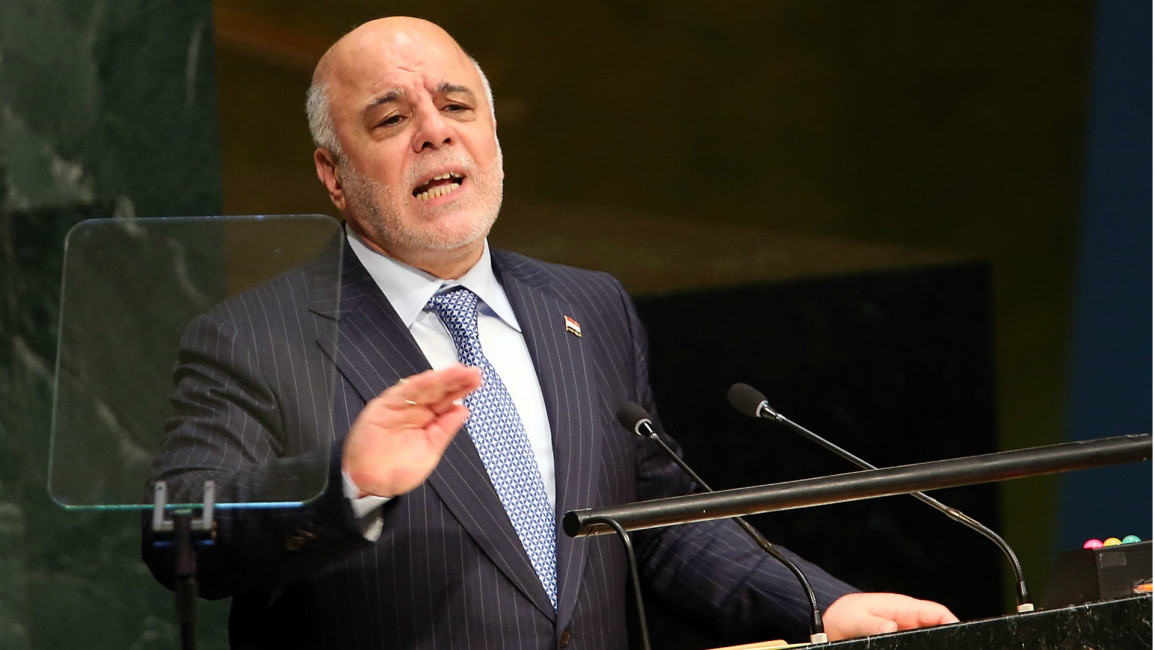Iraq's PM Abadi plans new set of reforms
Iraq's PM Abadi plans new set of reforms
Iraq's prime minister will launch a new round of political reforms but lawmakers and analysts are pessimistic about his ability to deliver on these promises.
2 min read
Abadi to launch new political reforms [Spencer Platt/Getty]
Iraqi Prime Minister Haider al-Abadi is preparing to launch a new round of political reforms that will include measures to streamline ministries, policy adjustments to rectify irregularities, and budget cuts according to a statement read by his spokesman on Monday.
Saad al-Hadithi said: "reforms would be carried out without cease and Abadi will take new measures in the coming days including streamlining the government, reducing the inefficiency of the administrative system in the whole country, and decreasing and rationing expenditure."
This comes two weeks after the Iraq's parliament voted to limit Abadi's powers in enacting reforms, forcing him to seek parliament's approval before going ahead with implementing new measures.
Iraqi lawmakers were divided between supporters of the new reform plans and those who are skeptical about them, particularly that some of them were still objecting to the older ones.
Commenting on the government's announcement, Iraqi MP Habib al-Tarfi told reporters: "The new reforms package will be passed to Parliament and we will consider the decisions contained in it, but in general, Abadi needs a high-level of coordination and to open a broad dialogue with political blocs to receive the support required to implement the reforms."
Saleh al-Ali, a political analysts, says that Abadi will have to cross many hurdles before he could implement any reforms, particularly that many Shia political blocs object to the previous reforms that he launched in August.
Leading Shia figures were sacked, including former vice president Nuri al-Maliki as part of the August reforms, but Abadi was not able to try them for corruption, according to al-Ali. Sunni blocs also accuse him of neglecting displaced Iraqis and demand that he gives priority to this issue, al-Ali added.
Some Iraqi lawmakers considered Abadi's previous reforms to be below the required level that the Iraqi people aspired for, and who viewed them as austerity measures rather than reforms.
Iraqi MP Mohammad al-Karbouli told al-Araby al-Jadeed: "Abadi's previous reforms were not radical but rather more like austerity measures, and therefore Abadi needs a new and real reforms package."
Abadi launched his first reform plans following mass protests against corruption, poor services and reckless government spending in August. Many took to the streets to express their support for Abadi's reforms, while calling on him to do more.
Meanwhile, parliament failed to approve the General Amnesty law, which was a key demand for many of Iraq's political groups - particularly Sunni political forces - on which condition Abadi's government was formed. Parliament's legal committee said that a vote won't be made on the law before early in 2016.
Saad al-Hadithi said: "reforms would be carried out without cease and Abadi will take new measures in the coming days including streamlining the government, reducing the inefficiency of the administrative system in the whole country, and decreasing and rationing expenditure."
This comes two weeks after the Iraq's parliament voted to limit Abadi's powers in enacting reforms, forcing him to seek parliament's approval before going ahead with implementing new measures.
Iraqi lawmakers were divided between supporters of the new reform plans and those who are skeptical about them, particularly that some of them were still objecting to the older ones.
Commenting on the government's announcement, Iraqi MP Habib al-Tarfi told reporters: "The new reforms package will be passed to Parliament and we will consider the decisions contained in it, but in general, Abadi needs a high-level of coordination and to open a broad dialogue with political blocs to receive the support required to implement the reforms."
Saleh al-Ali, a political analysts, says that Abadi will have to cross many hurdles before he could implement any reforms, particularly that many Shia political blocs object to the previous reforms that he launched in August.
Leading Shia figures were sacked, including former vice president Nuri al-Maliki as part of the August reforms, but Abadi was not able to try them for corruption, according to al-Ali. Sunni blocs also accuse him of neglecting displaced Iraqis and demand that he gives priority to this issue, al-Ali added.
Some Iraqi lawmakers considered Abadi's previous reforms to be below the required level that the Iraqi people aspired for, and who viewed them as austerity measures rather than reforms.
Iraqi MP Mohammad al-Karbouli told al-Araby al-Jadeed: "Abadi's previous reforms were not radical but rather more like austerity measures, and therefore Abadi needs a new and real reforms package."
Abadi launched his first reform plans following mass protests against corruption, poor services and reckless government spending in August. Many took to the streets to express their support for Abadi's reforms, while calling on him to do more.
Meanwhile, parliament failed to approve the General Amnesty law, which was a key demand for many of Iraq's political groups - particularly Sunni political forces - on which condition Abadi's government was formed. Parliament's legal committee said that a vote won't be made on the law before early in 2016.



